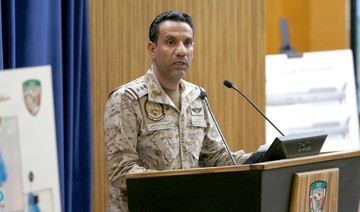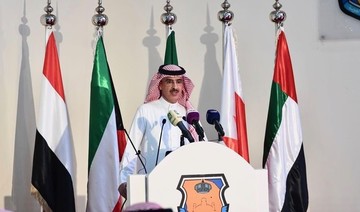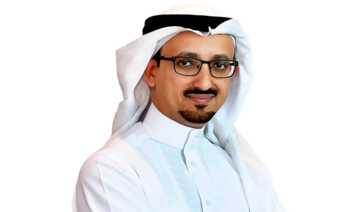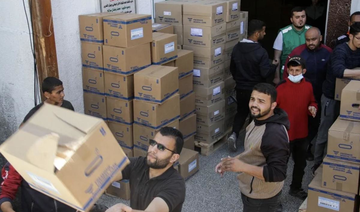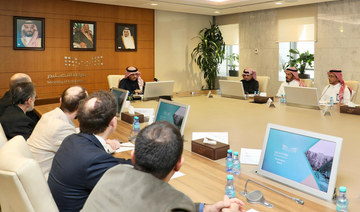RIYADH: The spokesman of the Joint Incidents Assessment Team (JIAT) in Yemen, legal consultant Mansour Bin Ahmed Al-Mansour, stressed that the team abides by transparency in announcing the results of engagement in Yemen.
This came in a news conference Al-Mansour held on Tuesday at King Salman Air Base in Riyadh for assessing several incidents. JIAT found that the Coalition Forces were not responsible for the incidents reported.
Al-Mansour reviewed several cases. They included the civilian fishing boat incident along the Yemeni coast in the Red Sea. which according to the Red Cross took place on Feb. 22, 2017. The Red Cross said the Coalition carried out attacks on civilians’ fishing boats along the Yemeni coast in the Red Sea, where two helicopters intercepted two fishing boats two nautical miles from Yakhtul coast. One of the helicopters targeted one of the boats, causing one death and two injuries.
However, JIAT investigations revealed that the Coalition Forces did not conduct any mission there on that date. Therefore, the Coalition Forces did not target the two fishing boats on the Yemeni coast.
The JIAT also investigated an incident in which the Coalition Air Forces on July 7, 2015 targeted Alwaht Mosque in Lahj Governorate, causing the deaths of 10 people and injured 15 others, according to the High Commissioner for Human Rights. In this instance the JIAT found that the closest target was 7km south of the Alwaht Mosque, which is north of Alwaht city.
The Coalition Air Forces carried out an air mission on a legitimate military target connected with the Houthi-armed militia, 300m away from the claimed location. After reviewing the satellite images of the coordinate given by the HCHR, it shows a destroyed building before April 15, 2015 — almost two months before the claimed date.
On investigating, JIAT found out that the Coalition Forces did not target Alwaht Mosque and that the procedures of the Coalition were carried out in accordance with the international humanitarian law and its customary rules.
Human Rights Watch also stated that the Coalition Forces at 10:50 p.m. on May 5, 2015 dropped three bombs on the Cultural Center and a vicinity house in Sa’dah, killing 28 people and injuring three others. Twenty-seven of these people were from one family. JIAT verified the incident, examined all related documents, and found that the Cultural Center was used for Maseerh FM to broadcast military news of the Houthi-armed militia in addition to broadcasting radio interviews with the Houthi leaders.
Based on that, the Cultural Center lost the legal protection of civilians because of the use of military actions and it was considered a legitimate military target.
Regarding the report issued by the Human Rights Watch in relation to the houses in Yarim, Ibb Directorate, which stated that an airstrike at 2 a.m. on July 19, 2015 caused the death of at least 16 civilians and injured 16 others in Yarim town, 120km from South Sana’a.
JIAT verified the incident, examined all related documents and assessed all gathered evidence. JIAT found that the Coalition Forces did not conduct any air missions on the day of the claim in Yarim town.
Human Rights Watch also stated that the Coalition Air Forces at 4:15 p.m. on May 12, 2015 targeted SHajjea Market with no fewer than five bombs, causing the death of 60 civilians and injuring at least 155 others.
JIAT found that there were no air missions throughout the governorate of Alhudeidah on the day claimed May 12, 2015, nor on the previous or following days. In light of that, JIAT found that the Coalition Air Forces did not target SHajjea Market in Zabid town.
Al-Mansour also announced the findings of investigations into what was broadcast in the media and the statement of the United Nations High Commissioner for Human Rights, that the Coalition Forces carried out an airstrike on a wedding in Bani Qais Directorate, Hajjah governorate on April 22, 2018. Initial investigations indicated that the two airstrikes killed at least 19 civilians, and 50 others were injured, most of them children. Also the airstrikes destroyed a wedding tent in a civilian house while the victims were celebrating a wedding.
Intelligence reports from Yemen indicated the presence of foreign ballistic missile experts, one a known Houthi leader, in a specific location in Hajjah governorate, which confirmed the previous information of the Coalition Forces about the arrival of foreign ballistic missile experts in Yemen through Alhudaydah port. Furthermore, seven ballistic missiles fired on Saudi Arabia were executed from Hajjah governorate.
JIAT reviewed the video recordings of the executed mission and could not verify the presence of a wedding tent in the targeted area. Also there were no indications of any ceremony gatherings in the targeted location.
JIAT also found that some of the rules of engagement were not followed to minimize collateral damages to the claimed tent as a result of targeting the building. JIAT recommends legal procedures should be taken against those responsible, and provides assistance for the damage and losses resulting from this mission.
A report from the International Committee of the Red Cross (ICRC) stated that there were two airstrikes on Sa’ada at 11:50 a.m. on April 9, 2018. One hit a welding workshop on Bin Salman road and the other hit the Higher Institute of Medical Science in Al Salam Hospital complex, causing the death of three civilians and injuring 19 others, some of them children.
In light of that, JIAT found that the ICRC report was not correct about the two airstrikes on the welding workshop and the Higher Institute of Medical Science, and that the procedures of the Coalition Forces in targeting the legitimate military target were carried out in accordance with international humanitarian law and its customary rules. JIAT also recommended that voluntary assistance be provided for the loss of the welding workshop.
Al-Mansour pointed out that the JIAT reports on realistic, clear and documented evidence, not on what is published in the social media, and that the Group formed a single system for the protection of human rights and the reduction of violations associated with military operations.
Fact-finding team presents results of 7 incidents in Yemeni conflict
Fact-finding team presents results of 7 incidents in Yemeni conflict
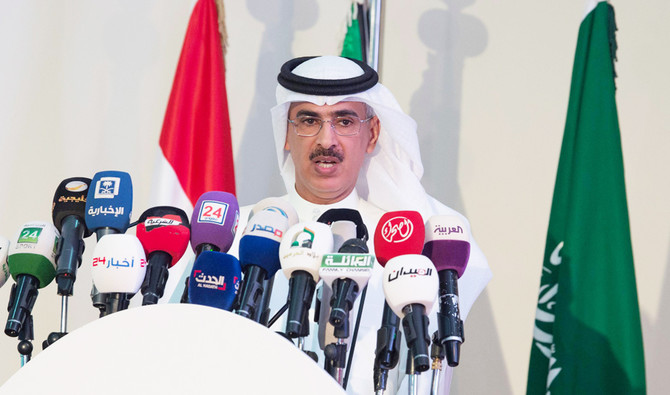
- JIAT joins organizations rejecting violations that happen during the military operations: Al-Mansour
- JIAT is independent and impartial: Al-Mansour
WEF forum in Riyadh: Geopolitical threats top risk for global economy, says Saudi minister of finance
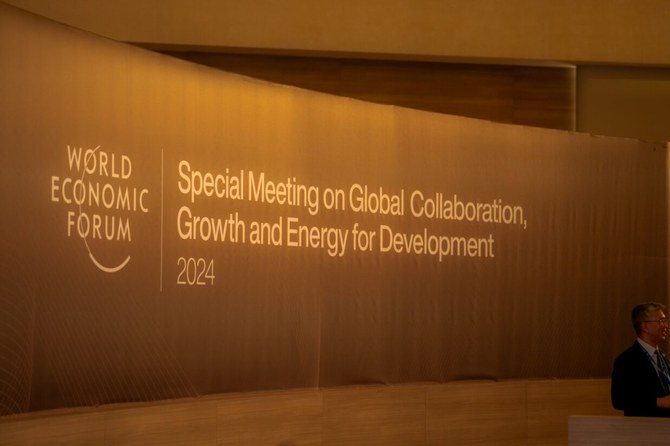
- Mohammed Al-Jadaan: Conflicts such as in Gaza put a lot of pressure on economic mood, and economies are impacted by sentiments
- For years Saudi Arabia has made it a specific objective to de-escalate in the region
RIYADH: Geopolitical threats, such as the Gaza war and conflict in Ukraine, are the foremost risk for the global economy nowadays, Mohammed Al-Jadaan, Saudi Arabia’s minister of finance, told a panel of the special two-day World Economic Forum (WEF) meeting in Riyadh.
“Geopolitical threats, which unfortunately are increasing instead of decreasing, are possibly the number one risk today if you look at the global economy at large. Geopolitical tensions bring other things that are directly impacting economies,” Al-Jadaan said.
The roiling Gaza war along with conflicts in Ukraine and elsewhere put “a lot of pressure on the economic emotion” such that “economies are impacted by sentiments,” the minister added.
“It is very unfortunate to see loss of lives. Civilian lives are important whether in Ukraine, or in Palestine.
“Cool-headed countries and leaders need to prevail, you need to make sure you de-escalate.”
The Saudi official has emphasized that the Kingdom in years has made it ‘a specific objective to de-escalate in the region.’
“The region needs to focus on its people, its growth, its economy rather than focus on politics and conflict.”
The conflict in Gaza spiralled with a surprise attack on October 7 by the militant group Hamas in southern Israel, which resulted into the death of 1,170 people, mostly civilians. Israel’s devastating retaliatory offensive meanwhile has killed at least 34,388 Gaza residents, mostly women and children.
Palestinian president Mahmoud Abbas, in a separate panel, said that “110,000 people have been killed or wounded in Gaza since October 7” and “75 percent of the territory” has been destroyed by the devastating Israeli military action.
“What happened in Gaza has not happened in Germany during the Second World War and other European countries. The fighting in Gaza must stop immediately and we warn against any plans for displacement,” Abbas said in his remarks.
Geopolitical maneuverings that weigh on the global economy, according to Al-Jadaan, could include ‘fragmentation, protectionism and using economy as a serious tool to achieve objectives in terms of limitations on trade, technology.’
“Policymakers need to be agile in dealing with these,” Al-Jadaan emphasized.
Kristalina Georgieva, the managing director of International Monetary Fund, agreed, noting that ‘fragmentation in the world economy was certainly bad for the prospect of growth.’
“The mmediate priorities for countries are to get inflation rates within targets; focus on rebuilding fiscal buffers and find ways to cooperate more,” Georgieva said in the opening panel.
“In economic planning, it is OK to change… to adjust on new circumstances. And that to me is the advice I would give to everyone. You need a long term plan, like Saudi Vision 2030, and doubling down on the implementation but also you need to make sure you adjust,” Al-Jadaan meanwhile said.
“In the longer term, regardless of what is happening today, you need to focus on your own people, your human capital. This is the longer term play that is critical.
“I can say this, Saudi Arabia and the region has the means to do it, but there are a lot of countries who wil find it difficult to provide quality education, quality healthcare for their people,” he said.
Around 1,000 thought leaders from 92 countries are in Riyadh for the World Economic Forum’s Special Meeting on Global Collaboration, Growth and Energy for Development to “promote forward-thinking approaches to interconnected crises, while remaining realistic about shorter-term trade-offs” and “work to bridge the growing North-South divide on issues such as emerging economic policies, the energy transition and geopolitical shocks.”
Heba Ismail brings Saudi representation to NFT ecosystem
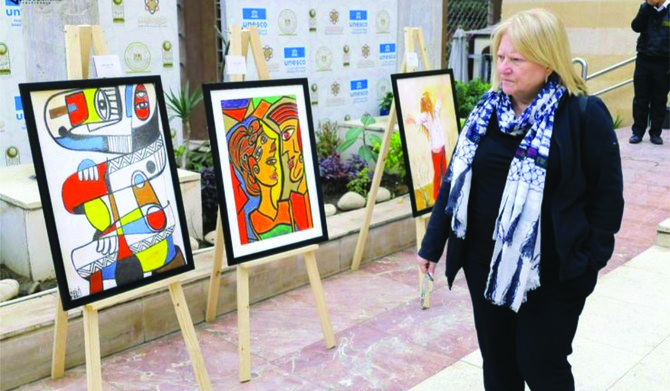
- Heba Ismail is highlighting ways for artists to flourish in the digital world
JEDDAH: Saudi artist Heba Ismail showcased her work at the Outer Edge Innovation Summit in Riyadh this week.
Commenting on her experience at the summit as one of the first Saudi artists to venture into the Web3 art scene, she said: “Having my paintings displayed on the event screens is a tremendous honor, offering global visibility and inspiring more Saudi and Arab artists to explore the diverse options available for sharing their art with the world.

“Through my participation with Nuqtah, the first Saudi NFT platform, I am eager to present my art on a global stage and connect with audiences in innovative ways,” she continued.
Non-fungible tokens — or NFTs — are, in this scenario, digital tokens that can be redeemed for a digital art work. Ismail is exploring their potential in the Saudi art scene.
HIGHLIGHTS
• With a professional background in dentistry, Heba Ismail found parallels between that meticulous work and her own creative process.
• Partnering with ChainVisory, a blockchain consultancy company, Ismail launched the Hebaism brand.
• It combines NFTs and original paintings, providing collectors with both digital and physical assets.
For Ismail, art has always been more than just a hobby — it’s been a lifelong calling. With a professional background in dentistry, Ismail found parallels between that meticulous work and her own creative process.

Inspired by movements including cubism, fauvism, and surrealism, Ismail’s art is a fusion of diverse influences and personal narratives “Each face represents a feeling and a vision documented on a painting. I paint poetry, and often times each piece is accompanied by a poem,” she said. “As a Saudi female, most of my paintings represent myself and my Saudi culture, which I am proud of. The characters are coded feelings, faces that tell a story — either joy, sadness, or acrimony.”

Her introduction to NFTs came in 2021, sparking a fascination with the technology and its potential. Partnering with ChainVisory, a blockchain consultancy company, Ismail launched her Hebaism brand, which combines NFTs and original paintings, providing collectors with both digital and physical assets.
As a female Saudi artist, I want to leave a mark and impact on every art platform, putting Saudi art on the map worldwide.
Heba Ismail, Saudi artist
“I wanted to keep the authentic classical painting process, yet the NFT world gave me a chance to meet and discover different ways to share my art and build a name and a brand,” she said. “It’s been an enlightening journey, uncovering the futuristic art process and connecting with a vibrant community through Web3.”
Ismail hopes to inspire other artists in the region to explore new avenues for artistic expression.
“As a female Saudi artist, I want to leave a mark and impact on every art platform, putting Saudi art on the map worldwide,” she said.
Who’s Who: Ahmed bin Ali Al-Suwailem, CEO of the National Center for Non-Profit Sector
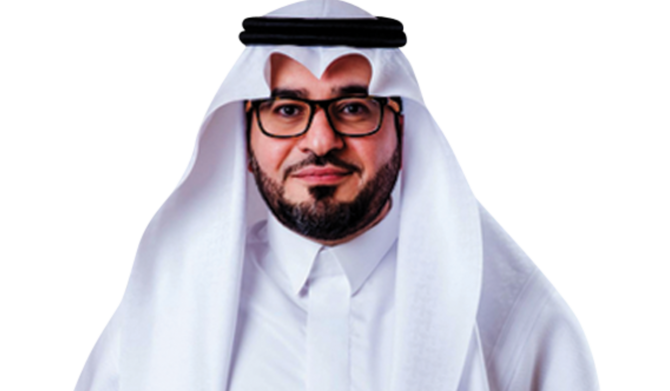
Ahmed Al-Suwailem has been CEO of the National Center for Non-Profit Sector since 2022. He has over 20 years of experience in the public and private sectors, specializing in economics, trade, finance, and banking.
Al-Suwailem is responsible for developing the Kingdom’s non-profit sector, expanding its impact on social and economic development, and integrating government efforts in licensing, financial supervision, and coordination.
Prior to his current position, Al-Suwailem, at various times, served as CEO of the National Anti-Commercial Concealment Program at the Saudi Ministry of Commerce; as adviser to the Saudi Minister of Commerce; and as secretary general of the Riyadh Chamber.
He has also been head of management information systems in financial planning and control at Saudi Investment Bank, and executive vice president of financial control at Gulf International Bank.
Al-Suwailem currently also serves as managing director and board member at the Riyadh International Exhibition Center and is a board member of the General Authority for Awqaf and the Associations Support Fund, a trustee of the Riyadh Economic Forum, and a member of the executive committee for remuneration and compensation at the Riyadh Chamber.
Al-Suwailem holds a master’s degree in finance from George Washington University in the US and a bachelor’s degree in accounting from King Saud University in Saudi Arabia.
He is a certified management accountant and public accountant and holds a certificate in international financial reporting standards and accreditation in exhibition and conference management from the International Association of Exhibitions and Events.
Saudi FM Prince Faisal hosts Arab ministerial meeting on Gaza situation in Riyadh
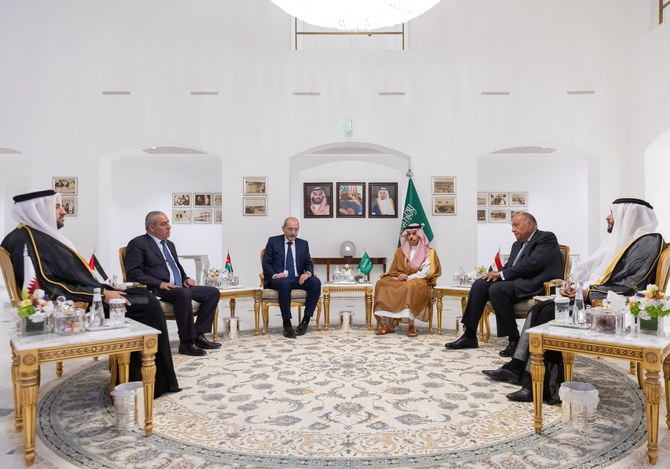
RIYADH: Saudi foreign minister Prince Faisal bin Farhan hosted a ministerial meeting on Saturday in Riyadh with representatives from six other Arab states to discuss the situation in Gaza, Saudi Press Agency reported.
The meeting was attended by Ayman Al-Safadi of Jordan, Egypt’s Sameh Shoukry, Secretary of the Executive Committee of the Palestine Liberation Organization Hussein Al-Sheikh, diplomatic adviser to the UAE president Anwar bin Mohammed Gargash, and Minister of State at the Qatari Ministry of Foreign Affairs, Mohammed bin Abdulaziz Al-Khulaifi.
They discussed the need to end the war on the Gaza Strip, reach an immediate and complete ceasefire, ensure the protection of civilians in accordance with international humanitarian law, and lift all restrictions that impede the entry of humanitarian aid into the enclave.
They also expressed their support for all efforts aimed at international recognition of an independent Palestinian state, something they agreed was vital for Palestinians to be able to take irreversible steps to implement the two-state solution.
The ministers stressed the need for a State of Palestine to be based on the borders of June 4, 1967, with East Jerusalem as its capital, in accordance with relevant international resolutions.
They expressed their categorical rejection of any attempts to displace the Palestinian people from their land, and any military operation in the Palestinian city of Rafah.
The ministers warned of the continuation of illegal Israeli measures in the West Bank and occupied East Jerusalem that undermine the two-state solution, including settlement expansion, land confiscation, military operations against Palestinians, settler attacks, and besieging freedom of worship for Muslims and Christians.
70 Saudi students win medals at tech Olympiad
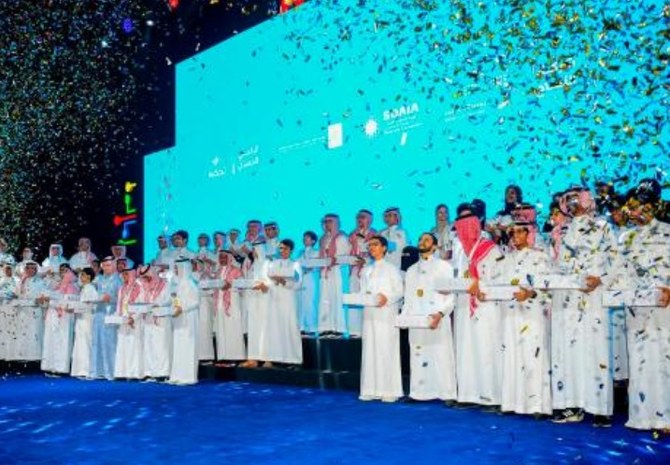
- Young talents from across the Kingdom shine in programming and AI
- The event also “aims to enhance the global competitiveness of this generation to help achieve the objectives of the Human Capacity Development Program, (part of) Saudi Vision 2030”
RIYADH: The National Olympiad for Programming and Artificial Intelligence (ATHKA) concluded on Saturday.
The event, organized over several months by the Saudi Data and Artificial Intelligence Authority, in partnership with the King Abdulaziz and His Companions Foundation for Giftedness and Creativity (Mawhiba) and the Ministry of Education was intended to “nurture a promising generation of Saudi school students from intermediate and secondary levels, totaling about 3 million across various regions and governorates of the Kingdom, in the fields of programming and artificial intelligence,” according to the Saudi Press Agency.
The SPA added that the event also “aims to enhance the global competitiveness of this generation to help achieve the objectives of the Human Capacity Development Program, (part of) Saudi Vision 2030.”
Saudi Minister of Education Yousef Al-Benyan; chairman of the board of directors of the Education and Training Evaluation Commission, Dr. Khalid bin Abdullah Al-Sabti; president of SDAIA, Abdullah Al-Ghamdi; and the secretary-general of Mawhiba, Amal Al-Hazzaa, along with several officials from the fields of education and academia, a select group of AI specialists, and parents of the students, attended the event at Princess Nourah bint Abdulrahman University.
Yaser Al-Onaizan, CEO of the National Center for Artificial Intelligence at SDAIA, delivered a presentation on AI and its role in developing human capabilities at the event. He noted that the human element is key to AI, and said that today’s students will become experts in new technologies faster than ever due to the ample learning and training opportunities in AI.
The final round of the competition was held from April 23 to 27 in Riyadh. Five students from the secondary level and five students from the intermediate level were awarded gold medals in the Olympiad. Eleven students from the secondary level and 10 from the intermediate level received silver medals, while 19 secondary students and 20 intermediate students earned bronze.
A total of 298 students competed in the final stage after qualifying from a pool of 260,000 Saudi students from across the Kingdom.
The Olympiad was designed to find “outstanding school students skilled in computational thinking to analyze and solve algorithmic programming challenges,” according to the SPA. “This step would help them enter the field of AI and encourage them to develop computational thinking skills, design AI-based algorithms, and recognize these skills as essential for learning in the 21st century.”
Its goals also included, the SPA reported, “harnessing young students’ intellectual abilities to solve complex problems, fostering a knowledge-based economy, promoting competitive programming, and cultivating a generation capable of excelling in international Olympiads in informatics and AI. Additionally, it aimed to build and strengthen the next generation’s skills in advanced technology, including AI-related fields.”


